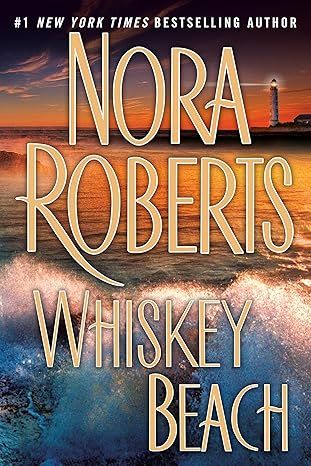Whiskey Beach
4.5
-
29,392 ratings
#1 New York Times bestselling author Nora Roberts weaves together passion and obsession, humor and heart, in a novel of two people opening themselves up to the truth—and to each other.
For more than three hundred years, Bluff House has sat above Whiskey Beach, guarding its shore—and its secrets. But to Eli Landon, it’s home.
A Boston lawyer, Eli has weathered an intense year of public scrutiny and police investigations after being accused of—but never arrested for—the murder of his soon-to-be ex-wife.
He finds sanctuary at Bluff House, even though his beloved grandmother is in Boston recuperating from a nasty fall. Abra Walsh is always there, though. Whiskey Beach’s resident housekeeper, yoga instructor, jewelry maker and massage therapist, Abra is a woman of many talents—including helping Eli take control of his life and clear his name. But as they become entangled in each other, they find themselves caught in a net that stretches back for centuries—one that has ensnared a man intent on reaping the rewards of destroying Eli Landon once and for all.
Kindle
$8.99
Available instantly
Audiobook
$0.00
with membership trial
Hardcover
$3.33
Paperback
$11.57
Ships from
Amazon.com
Payment
Secure transaction
ISBN-10
0425269817
ISBN-13
978-0425269817
Print length
512 pages
Language
English
Publisher
Berkley
Publication date
March 31, 2014
Dimensions
5.47 x 1.13 x 8.35 inches
Item weight
1.05 pounds
Popular Highlights in this book
Marriage is a series of compromises, and at its best, the compromises create a life, a partnership.
Highlighted by 591 Kindle readers
The Landons were privileged because they worked, and worked because they were privileged.
Highlighted by 184 Kindle readers
He wanted himself back. And damned if he knew how to do it. Where had he gone? He couldn’t remember what it felt like to be happy. But he knew he had been. He’d had friends, interests, ambitions. He’d had fucking passion.
Highlighted by 174 Kindle readers
Product details
ASIN :
B00AFPVR1Q
File size :
4367 KB
Text-to-speech :
Enabled
Screen reader :
Supported
Enhanced typesetting :
Enabled
X-Ray :
Enabled
Word wise :
Enabled
Editorial Reviews
Praise for Whiskey Beach
“Roberts delivers another dazzler.”—Library Journal
“A perfect synthesis of romance and suspense, guaranteed to keep Roberts' fans up long past their bedtimes.”—Booklist
“Spellbinding...Roberts enthralls the reader with enigmatic characters and effortless plotting from the first page of this masterfully crafted novel.”—Publishers Weekly (starred review)
“A sweet, sexy romance with an intriguing historical family mystery that bleeds into a modern-day crime spree.”—Kirkus Reviews
“A must-read for Roberts' fans.”—Romance Junkies
“Whiskey Beach has everything a reader could want: a compelling mystery, engaging characters, a charming setting, snappy dialogue, wit, warmth, passion, a cool title and an endearing dog.”—The Frederick News-Post (MD)
“Buried treasure ramps up the suspense in this can't-miss beach read.”—Fort Worth Star-Telegram
Sample
One
THROUGH THE CHILLY CURTAIN OF SLEET, IN THE INTERMITTENT wash of the great light on the jutting cliff to the south, the massive silhouette of Bluff House loomed over Whiskey Beach. It faced the cold, turbulent Atlantic like a challenge.
I will last as long as you.
Standing three sturdy and indulgent stories above the rough and rugged coast, it watched the roll and slap of waves through the dark eyes of windows, as it had—in one incarnation or another—for more than three centuries.
The little stone cottage now housing tools and garden supplies spoke to its humble beginnings, to those who’d braved the fierce and fickle Atlantic to forge a life on the stony ground of a new world. Dwarfing those beginnings, the spread and rise of golden sand walls and curving gables, the generous terraces of weathered local stone sang to its heyday.
It survived storm, neglect, careless indulgence, dubious taste, the booms and the busts, scandal and righteousness.
Within its walls, generations of Landons had lived and died, celebrated and mourned, schemed, thrived, triumphed and languished.
It had shone as bright as the great light that swept the water off Massachusetts’ rocky and glorious north shore. And it had huddled, shuttered in the dark.
It had stood long, so long now it simply was Bluff House, reigning above the sea, the sand, the village of Whiskey Beach.
For Eli Landon it was the only place left to go. Not a refuge as much as an escape from everything his life had become over the past eleven horrible months.
He barely recognized himself.
The two-and-a-half-hour drive up from Boston over slick roads left him exhausted. But then, he admitted, fatigue cozied up to him like a lover most days. So he sat outside the house, in the dark, sleet splatting off his windshield, his roof, while he debated the choices of gathering enough energy to go inside or just staying put, maybe sliding into sleep in the car.
Stupid, he thought. Of course he wouldn’t just sit there and sleep in the car when the house, with perfectly good beds to choose from, stood only a few feet away.
But neither could he drum up the enthusiasm for hauling his suitcases out of the trunk. Instead he grabbed the two small bags on the seat beside him, ones holding his laptop and a few essentials.
Sleet slapped at him when he climbed out of the car, but the cold, that whistling Atlantic wind, cut through the outer layers of lethargy. Waves boomed against the rock, slapped against the sand, combining into a constant hissing roar. Eli dragged the house keys out of his jacket pocket, stepped onto the shelter of the wide stone portico to the massive double entrance doors hewn more than a century before from teak imported from Burma.
Two years, he thought—closer to three—since he’d been here. Too busy with his life, with work, with the disaster of his marriage to drive up for a weekend, a short vacation, a holiday visit with his grandmother.
He’d spent time with her, of course, the indomitable Hester Hawkin Landon, whenever she’d come to Boston. He’d called her regularly, e-mailed, Facebooked and Skyped. Hester might have been cruising toward eighty but she’d always embraced technology and innovation with curiosity and enthusiasm.
He’d taken her to dinner, to drinks, remembered flowers and cards, gifts, gathered with her and his family for Christmas, important birthdays.
And that, he thought as he unlocked the door, was all just rationalization for not taking the time, making the time, to come to Whiskey Beach, to the place she loved most, and giving her real time, real attention.
He found the right key, unlocked the door. Stepping inside, he flicked on the lights.
She’d changed some things, he noted, but Gran embraced change even as she managed to embrace traditions—that suited her.
Some new art—seascapes, gardenscapes—splashing soft color against rich brown walls. He dumped his bags just inside the door, took a moment to just look around the glossy spill of the entrance hall.
He scanned the stairs—the grinning gargoyle newel posts some whimsical Landon had commissioned—and up where they curved gracefully right and left for the north and south wings.
Plenty of bedrooms, he thought. He just had to climb the stairs and pick one.
But not yet.
Instead he walked through to what they called the main parlor with its high, arching windows facing the front garden—or what would be once winter opened its claws.
His grandmother hadn’t been home for over two months, but he didn’t see a speck of dust. Logs lay in the hearth framed by the gleam of lapis and ready to light. Fresh flowers stood on the Hepplewhite table she prized. Pillows sat fluffed and welcoming on the three sofas ranged around the room, and the wide planked chestnut floor gleamed like a mirror.
She’d had someone come in, he decided, then rubbed his forehead where a headache threatened to bloom.
She’d told him, hadn’t she? Told him she had someone looking out for the place. A neighbor, someone who did the heavy cleaning for her. He hadn’t forgotten she’d told him, he’d just lost the information for a moment in the fog that too often crawled in to blur his mind.
Now looking out for Bluff House was his job. To tend to it, to, as his grandmother had asked, keep life in it. And maybe, she’d said, it would pump some life back into him.
He picked up his bags, looked at the stairs. Then just stood.
She’d been found there, there at the base of the steps. By a neighbor—the same neighbor? Wasn’t it the same neighbor who cleaned for her? Someone, thank God, had come by to check on her, and found her lying there unconscious, bruised, bleeding, with a shattered elbow, a broken hip, cracked ribs, a concussion.
She might’ve died, he thought. The doctors expressed amazement that she’d stubbornly refused to. None of the family routinely checked on her daily, no one thought to call, and no one, including himself, would have worried if she hadn’t answered for a day or two.
Hester Landon, independent, invincible, indestructible.
Who might have died after a terrible fall, if not for a neighbor—and her own indefatigable will.
Now she reigned in a suite of rooms in his parents’ home while she recovered from her injuries. There she’d stay until deemed strong enough to come back to Bluff House—or if his parents had their way, there she would stay, period.
He wanted to think of her back here, in the house she loved, sitting out on the terrace with her evening martini, looking out at the ocean. Or puttering in her garden, maybe setting up her easel to paint.
He wanted to think of her vital and tough, not helpless and broken on the floor while he’d been pouring a second cup of morning coffee.
So he’d do his best until she came home. He’d keep life in her house, such as his was.
Eli picked up his bags, started upstairs. He’d take the room he’d always used on visits—or had before those visits stretched out fewer and farther between. Lindsay had hated Whiskey Beach, Bluff House, and had made trips there into a cold war with his grandmother rigidly polite on one side, his wife deliberately snide on the other. And he’d been squeezed in the middle.
So he’d taken the easy way, he thought now. He could be sorry about that, sorry he’d stopped coming, sorry he’d made excuses and had limited his time with his grandmother to her trips to Boston. But he couldn’t turn back the clock.
He stepped into the bedroom. Flowers here, too, he noted, and the same soft green walls, two of his grandmother’s watercolors he’d always particularly liked.
He put his bags on the bench at the foot of the sleigh bed, stripped off his coat.
Here, things had stayed the same. The little desk under the window, the wide atrium doors leading to the terrace, the wingback chair and the little footstool with the cover his grandmother’s mother had needlepointed long ago.
It occurred to him that for the first time in a very long time he felt—almost—at home. Opening his bag, he dug out his toiletry kit, then found fresh towels, fancy seashell soaps. The scent of lemons in the bath.
He stripped down without glancing at the mirror. He’d lost weight, too much weight, over the last year. He didn’t need to remind himself of it. He turned on the shower, stepped in, hoping to burn some of the fatigue away. He knew from experience if he went to bed exhausted and stressed, he’d sleep fitfully, wake with that dragging hangover.
When he stepped out he grabbed one of the towels from the stack, again caught the whiff of lemon as he scrubbed it over his hair. Damp, it curled past the nape of his neck, a mop of dark blond longer than it had been since his early twenties. But then he hadn’t seen his usual barber, Enrique, for nearly a year. He hardly had the need for a hundred-fifty-dollar haircut, or the collection of Italian suits and shoes packed in storage.
He was no longer a sharply dressed criminal attorney with a corner office and the fast track to full partner. That man had died along with Lindsay. He just hadn’t known it.
He tossed back the duvet, as fluffy and white as the towel, slid in, switched off the light.
In the dark he could hear the sea, a steady growl, and the sizzle of sleet against the windows. He closed his eyes, wished as he did every night for a few hours of oblivion.
A few was all he got.
God damn, he was pissed. Nobody, absolutely nobody, he thought as he drove through the hard, freezing rain, could trip his switch like Lindsay.
The bitch.
Her mind, and apparently her morals, worked like no one else’s he knew. She’d managed to convince herself, and he was sure any number of her friends, her mother, her sister, and Christ knew, that it was his fault their marriage had deteriorated, his they’d gone from couples counseling to a trial separation to a legal battle in preparation for divorce.
And his fucking fault she’d been cheating on him for well over eight months—five more than the “trial” separation she’d campaigned for. And somehow it was on him that he’d found out about her lying, cheating, conniving ass before signing on the dotted line so she could walk away with a fat settlement.
So they were both pissed, he decided—he that he’d been an idiot, and she that he’d finally clued in.
No doubt it would be his fault they’d had a bitter, vicious and public fight about her adultery that afternoon in the art gallery where she worked part-time. Bad timing, bad form on his part, he admitted, but right now? He didn’t give a shit.
She wanted to blame him because she’d gotten sloppy, so sloppy his own sister had seen his estranged wife and another man all over each other in a hotel lobby in Cambridge—before they’d gotten on the elevator together.
Maybe Tricia had waited a couple days to tell him, but he couldn’t blame her. It was a lot to tell. And he’d taken another couple to absorb it before he’d manned up, hired an investigator.
Eight months, he thought again. She’d been sleeping with someone else in hotel beds, in B&Bs, God knew where else—though she’d been too smart to use the house. What would the neighbors think?
Maybe he shouldn’t have gone, armed with the investigator’s report and his own fury, to the gallery to confront her. Maybe the two of them should’ve had more sense than to start a shouting match that carried through the place and out to the street.
But they’d both have to weather the embarrassment.
One thing he knew: the settlement wouldn’t be so sweet for her now. All concept of clean and fair, and no need to stick hard to the prenup? Done. She’d find that out when she got home from her charity auction and found he’d taken the painting he bought in Florence, the Deco diamond that had been his great-grandmother’s and had come to him, and the silver coffee set he had no interest in but was another family heirloom he’d be damned if she’d throw into the community property pot.
She was going to find herself batting in a new ball game.
Maybe it was petty, maybe it was stupid—or maybe it was right and just. He couldn’t see through the anger and betrayal, and simply didn’t care. Riding on that anger, he pulled up in the driveway of the house in Boston’s Back Bay. A house he’d believed would serve as a solid foundation for a marriage that had begun to show some cracks. One he’d hoped would one day house children, and one that, for a short time, had plastered over those cracks as he and Lindsay had outfitted it, chosen furnishings, debated, argued, agreed—all of which he considered normal—over little details.
Now they’d have to sell it, and both likely walk away with half of little to nothing. And instead of renting a condo for what he’d hoped would be the short term, he’d end up buying one.
For himself, he thought as he climbed out of the car and into the rain. No debates, arguments or agreements necessary.
And, he realized as he jogged to the front door, that came as a kind of relief. No more holding time, no more maybes, no more pretense his marriage could or should be saved.
Maybe in her lying, deceitful, cheating way, she’d done him a favor.
He could walk away now without guilt or regret.
But he’d damn well walk away with what was his.
He unlocked the door, stepped into the wide, gracious foyer. Turning to the alarm pad, he keyed in the code. If she’d changed it, he had his ID, listing his name and this address. He’d already worked out how to handle any police or security questions.
He’d simply say his wife had changed the code—true enough—and he’d forgotten it.
But she hadn’t. The fact that she hadn’t was both relief and insult. She thought she knew him so well, was so sure he’d never enter the house that was half his without her permission. He’d agreed to move out, to give them both some space, so he’d never intrude, never push too hard.
She assumed he’d be fucking civilized.
She was soon to discover she didn’t know him at all.
He stood a moment, absorbing the quiet of the house, the feel of it. All those neutral tones serving as a backdrop of splashes and flashes of color, the mix of old, new, cleverly quirky adding style.
She was good at it, he could admit that. She knew how to present herself, her home, knew how to arrange successful parties. There had been some good times here, spikes of happiness, stretches of contentment, moments of easy compatibility, some good sex, some lazy Sunday mornings.
How did it all go so wrong?
“Screw it,” he muttered.
Get in, get out, he told himself. Being in the house just depressed him. He went upstairs, directly to the sitting room off the master bedroom—noted she had an overnight bag on the luggage rack, half packed.
She could go wherever the hell she wanted to go, he thought, with or without her lover.
Eli focused in on what he’d come for. Inside the closet, he keyed in the combination for the safe. He ignored the stack of cash, the documents, the jewelry cases holding pieces he’d given her over the years, or she’d bought for herself.
Just the ring, he told himself. The Landon ring. He checked the box, watched it wink and flash in the light, then shoved it into the pocket of his jacket. Once the safe was secured again and he started back down, it occurred to him he should’ve brought bubble wrap or some protection for the painting.
He’d grab some towels, he decided, something to shield it from the rain. He took a couple of bath sheets from the linen closet, kept going.
In and out, he told himself again. He hadn’t known how much he wanted out of that house, away from the memories—good and bad.
In the living room he took the painting off the wall. He’d bought it on their honeymoon because Lindsay had been so taken with it, with the sun-washed colors, the charm and simplicity of a field of sunflowers backed by olive groves.
They’d bought other art since, he thought as he wrapped the towels around it. Paintings, sculptures, pottery certainly of greater value. They could all go in the communal pile, all be part of the mechanism of negotiation. But not this.
He laid the padded painting on the sofa, moved through the living area with the storm slashing overhead. He wondered if she was driving in it, on her way home to finish packing for the overnight trip with her lover.
“Enjoy it while it lasts,” he murmured. Because first thing in the morning, he was calling his divorce attorney and letting him off the leash.
From now on, he intended to go for the throat.
He turned into the room they’d fashioned into a library and, as he started to hit the light switch, saw her in a shuddering burst of icy lightning.
From that moment to the answering bellow of thunder, his mind went blank.
“Lindsay?”
He slapped at the switch as he lurched forward. Inside him waged a war between what he saw and what he could accept.
She lay on her side in front of the hearth. Blood, so much blood on the white marble, the dark floor.
Her eyes, that rich chocolate that had so captivated him once, were filmed glass.
“Lindsay.”
He dropped down beside her, took the hand stretched out on the floor as if reaching. And found her cold.
In Bluff House, Eli woke, dragging himself out of the blood and shock of the recurring dream and into sunlight.
For a moment he just sat as he’d reared up, disoriented, hazy. He stared around the room, remembering as his thumping heart leveled again.
Bluff House. He’d come to Bluff House.
Lindsay had been dead nearly a year. The house in the Back Bay was finally on the market. The nightmare was behind him. Even if he still felt its breath on the back of his neck.
He shoved at his hair, wished he could delude himself so he could just go back to sleep, but he knew if he closed his eyes again, he’d be right back in the little library, right back beside the body of his murdered wife.
And yet he couldn’t think of a single good reason to get out of bed.
He thought he heard music—dim, distant. What the hell was that music?
He’d gotten so used to noises—voices, music, TV mumbling—during the last few months in his parents’ house he hadn’t registered there shouldn’t be music, or anything but the sound of the sea or the wind.
Had he turned on a radio, a television, something, and forgotten? It wouldn’t be the first time since his long downward spiral.
So, a reason to get up, he decided.
As he hadn’t brought in the rest of his bags, he yanked on the jeans he’d worn the day before, grabbed the shirt and shrugged into it as he started out of the bedroom.
It didn’t sound like a radio, he realized as he approached the stairs. Or not just a radio. He recognized Adele easily enough as he moved through the main floor, but clearly heard a second female voice forming a kind of passionate—and loud—duet.
He followed the sound, winding through the house toward the kitchen.
Adele’s singing partner reached into one of the three cloth market bags on the counter, drew out a small bunch of bananas and added them to a bamboo bowl of apples and pears.
He couldn’t quite get his mind around it, any of it.
She sang full out, and well—not with Adele’s magic, but well. And looked like a fairy, of the long and willowy variety.
A mass of long curls the color of walnut tumbled around her shoulders, spilled down the back of a dark blue sweater. Her face was . . . unusual, was all he could think. Long, almond-shaped eyes, the sharp nose and cheekbones, the top-heavy mouth down to the mole at its left corner struck him as just a little otherworldly.
Or maybe it was just his fogged brain and the circumstances.
Rings glinted on her fingers. Dangles swung from her ears. A crescent moon hung around her neck, and a watch with a face as round and white as a baseball rode her left wrist.
Still belting it out, she lifted a quart of milk, a pound of butter from the bag, started to turn toward the refrigerator. And saw him.
She didn’t scream, but did take a stumbling step back, and nearly bobbled the milk.
“Eli?” She set down the milk, laid a beringed hand on her heart. “God! You scared me.” With a throaty, breathless laugh, she shook back all that curling hair. “You aren’t due until this afternoon. I didn’t see your car. But I came in the back,” she continued, gesturing toward the door leading out to the main terrace. “I guess you came in the front. Why wouldn’t you? Did you drive up last night? Less traffic, I guess, but crappy roads with the sleet.
“Anyway, here you are. Would you like some coffee?”
She looked like a long-legged fairy, he thought again, and had a laugh like a sea goddess.
And she’d brought bananas.
He just stared at her. “Who are you?”
“Oh, sorry. I thought Hester told you. I’m Abra. Abra Walsh. Hester asked me to get the house ready for you. I’m just stocking the kitchen. How’s Hester? I haven’t spoken to her for a couple of days—just quick e-mails and texts.”
“Abra Walsh,” he repeated. “You found her.”
“Yes.” She dug a bag of coffee beans out of a sack and began to fill a machine much like one he’d used daily at his law offices. “Horrible day. She didn’t come to yoga class—she never misses. I called, but she didn’t answer, so I came over to check. I have a key. I clean for her.”
While the machine hummed, she put an oversize mug under the spout, then continued putting away the groceries. “I came in the back—habit. I called for her, but . . . Then I started to worry maybe she wasn’t feeling well, so I walked through to go upstairs. And she was lying there. I thought . . . but she had a pulse, and she came around for a minute when I said her name. I called for an ambulance, and I got the throw off the sofa because I was afraid to move her. They were quick, but at the time, it seemed like hours.”
She got a carton of cream out of the refrigerator, added it to the mug. “Counter or breakfast nook?”
“What?”
“Counter.” She set the coffee down on the island. “That way you can sit and talk to me.” When he just stared at the coffee, she smiled. “That’s right, isn’t it? Hester said a dollop of cream, no sugar.”
“Yeah. Yes, thanks.” Like a man sleepwalking, he moved to the island, sat on the stool.
“She’s so strong, so smart, so herself. She’s my hero, your grandmother. When I moved here a couple of years ago, she was the first person I really connected with.”
She just kept talking. It didn’t matter if he listened, she thought. Sometimes the sound of someone’s voice could be comfort, and he looked as if he needed comfort.
She thought of the photos Hester had shown her of him, from a few years back. The easy smile, the light in his Landon blue eyes—crystal blue with a dark, dark rim around the iris. Now he looked tired, sad and too thin.
She’d do what she could to fix that.
So thinking, she took eggs, cheese, ham out of the refrigerator.
“She’s grateful you agreed to stay here. I know it upset her thinking of Bluff House empty. She said you’re writing a novel?”
“I . . . mmmm.”
“I’ve read a couple of your short stories. I liked them.” She put an omelet pan on the stove to heat. While it did, she poured a glass of orange juice, put some berries in a little colander to wash, bread in the toaster. “I wrote bad romantic poetry when I was a teenager. It was even worse when I tried to set it to music. I love to read. I admire anyone who can put words together to tell a story. She’s so proud of you. Hester.”
He looked up then, met her eyes. Green, he realized, like a sea in thin fog, and as otherworldly as the rest of her.
Maybe she wasn’t here at all.
Then her hand lay over his, just for a moment, warm and real. “Your coffee’s going to get cold.”
“Right.” He lifted the mug, drank. And felt marginally better.
“You haven’t been here for a while,” she continued, and poured the egg mixture into the omelet pan. “There’s a nice little restaurant down in the village—and the pizza parlor’s still there. I think you’re pretty well stocked now, but the market’s still there, too. If you need anything and don’t want to go into the village, just let me know. I’m in Laughing Gull Cottage if you’re out and want to stop in. Do you know it?”
“I . . . yes. You . . . work for my grandmother?”
“I’ve cleaned for her once or twice a week, as she’s needed it. I clean for a few people—as they need it. I teach yoga five times a week, in the church basement, and an evening a week in my cottage. Once I convinced Hester to try yoga, she was hooked. I do massages”—she gave him a quick grin over her shoulder—“therapeutic. I’m certified. I do a lot of things, because a lot of things interest me.”
She plated the omelet with the fresh berries and toast. Set the plate in front of him, added a red linen napkin and flatware. “I have to go, I’m running a little late.”
She folded the market bags into an enormous red tote, slipped on a dark purple coat, wound a scarf of striped jewel tones around her neck, yanked on a purple wool cap.
“I’ll see you the day after tomorrow, about nine.”
“The day after tomorrow?”
“To clean. If you need anything in the meantime, my numbers—cell and home—are on the board right there. Or if you’re out for a walk and I’m home, stop by. So . . . welcome back, Eli.”
She walked to the patio door, turned, smiled. “Eat your breakfast,” she ordered, and was gone.
He sat, staring at the door, then looked down at his plate. Because he couldn’t think of anything else to do, he picked up his fork and ate.
Read more
About the authors
Nora Roberts
Nora Roberts is the #1 New York Times bestselling author of more than 200 novels, including Shelter in Place, Year One, Come Sundown, and many more. She is also the author of the bestselling In Death series written under the pen name J.D. Robb. There are more than five hundred million copies of her books in print.
Reviews
Customer reviews
4.5 out of 5
29,392 global ratings
R. Whitaker
5
It was a really good read I missed along the way
Reviewed in the United States on June 28, 2024
Verified Purchase
I loved the detail, of picturesque town. It made me feel I could see it all. Great characters as always. Really enjoyed this one.
J. Stevens
5
Good Read
Reviewed in the United States on July 18, 2024
Verified Purchase
If you like a good mystery this book will hit the mark. Not the typical NR book which was nice to experience. Many twists and laughter.
Laurel-Rain Snow
5
GORGEOUS SETTINGS, AN INTRIGUING MYSTERY, & MURDER
Reviewed in the United States on August 22, 2014
Verified Purchase
Eli Landon has come back to Bluff House in Whiskey Beach, beaten down and troubled after a traumatic year in Boston. His grandmother Hester, who has lived in the home for years, is recuperating in Boston after a fall one night that left her without her memories of what had transpired.
The big old house is filled with sentimental objects and reminders of the family legacy. Abra Walsh, his grandmother's housekeeper, has taken on the project of helping Eli recover from his horrendous year, and her little reminders of healthy living in the form of post-its are amusing and delightful. Will a special connection develop between these two?
What Eli must try to piece together is what really happened to his wife Lindsay, who was found murdered in their Back Bay home. One bulldog cop named Wolfe is sure that Eli killed her, but neither he nor the DA have been able to make a case. But that doesn't mean he didn't do it, is Wolfe's line of thought.
Starting over in Whiskey Beach will become complicated by some troubling events that happen soon after Eli's return. A break-in, an assault on Abra, a P.I. who is investigating Eli, and then the death of that same P.I.
And who is digging trenches in the Bluff House basement? What is the truth behind the legend of Esmeralda's Dowry, a supposedly buried treasure? Are all these events somehow connected? And what long buried secrets will be unearthed?
Read more
5 people found this helpful
Steven T. Stone
5
Another Great Read
Reviewed in the United States on July 27, 2024
Verified Purchase
Whether she be Nora Roberts or J D Robb, she sure can spin a tale! Her imagery and language combine with realistic plots to entertain. Whiskey Beach continues the magic.
Aniela
5
Fascinating mystery
Reviewed in the United States on July 8, 2024
Verified Purchase
Nora Roberts is an incredible storyteller, and this book showcases her gift. Treasure, murder, an old family home, and romance. It was truly fun and interesting to read!
Top Nora Roberts titles

Dance of Dreams
4.4
-
2,545
$7.99
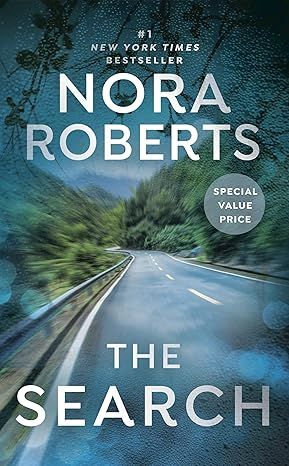
The Search
4.6
-
17,581
$3.33
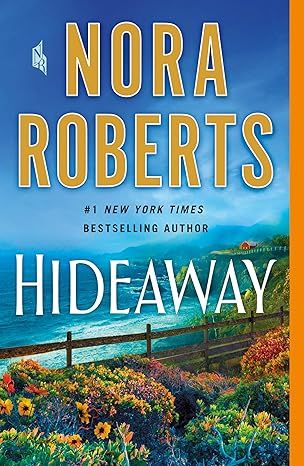
Hideaway
4.5
-
28,237
$1.93
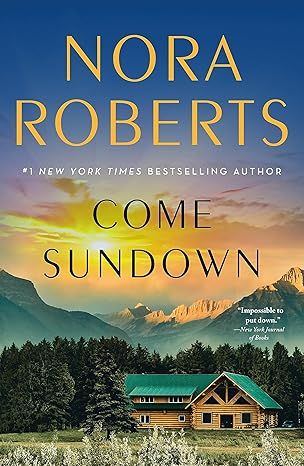
Come Sundown: A Novel
4.5
-
28,396
$8.99
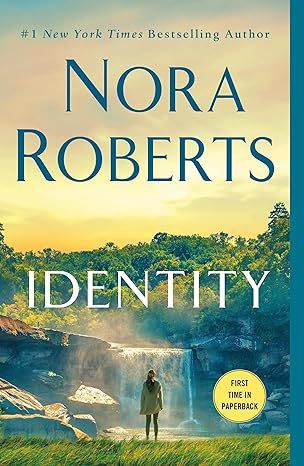
Identity
4.7
-
33,614
$11.98
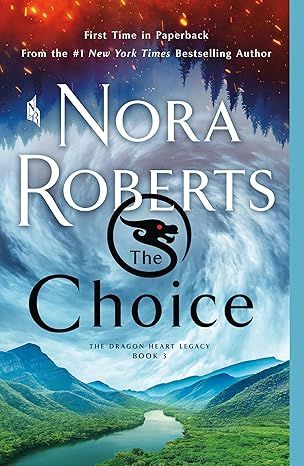
Choice (The Dragon Heart Legacy, 3)
4.7
-
22,366
$12.99
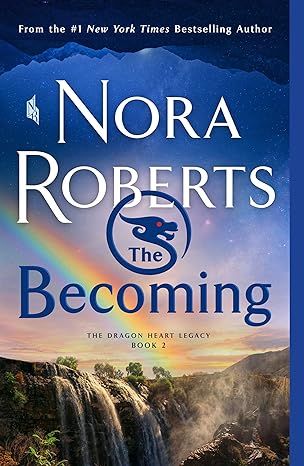
Becoming (The Dragon Heart Legacy, 2)
4.7
-
26,424
$9.99
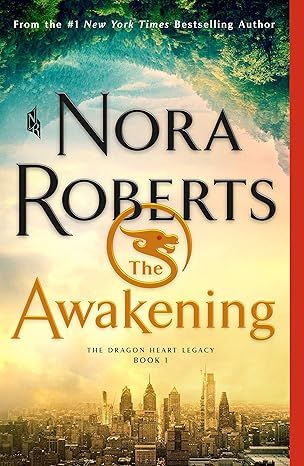
The Awakening: The Dragon Heart Legacy, Book 1 (The Dragon Heart Legacy, 1)
4.7
-
31,307
$9.55
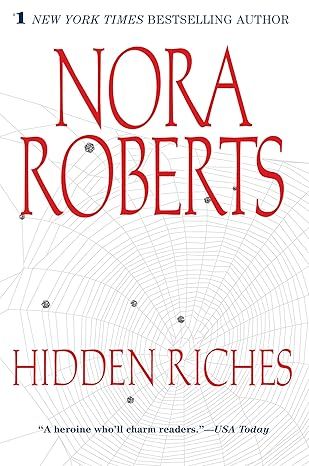
Hidden Riches
4.6
-
9,512
$2.99

Reflections (Bannion Family)
4.4
-
2,823
$7.99
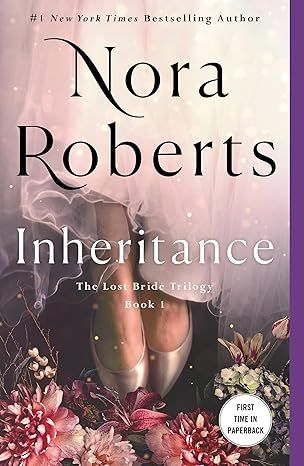
Inheritance: The Lost Bride Trilogy, Book 1 (The Lost Bride Trilogy, 1)
4.7
-
22,046
$14.99
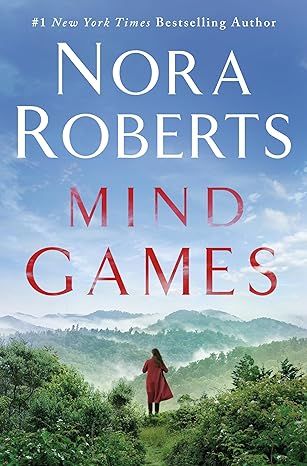
Mind Games: A Novel
4.7
-
12,513
$14.99
Best Sellers

The Tuscan Child
4.2
-
100,022
$8.39

The Thursday Murder Club: A Novel (A Thursday Murder Club Mystery)
4.3
-
155,575
$6.33

Sapiens: A Brief History of Humankind
4.6
-
140,302
$13.49

The Butterfly Garden (The Collector, 1)
4.3
-
88,556
$9.59

Things We Hide from the Light (Knockemout Series, 2)
4.4
-
94,890
$11.66

The Last Thing He Told Me: A Novel
4.3
-
154,085
$2.99

The Perfect Marriage: A Completely Gripping Psychological Suspense
4.3
-
143,196
$9.47

The Coworker
4.1
-
80,003
$13.48

First Lie Wins: A Novel (Random House Large Print)
4.3
-
54,062
$14.99

Mile High (Windy City Series Book 1)
4.4
-
59,745
$16.19

Layla
4.2
-
107,613
$8.99

The Locked Door
4.4
-
94,673
$8.53
